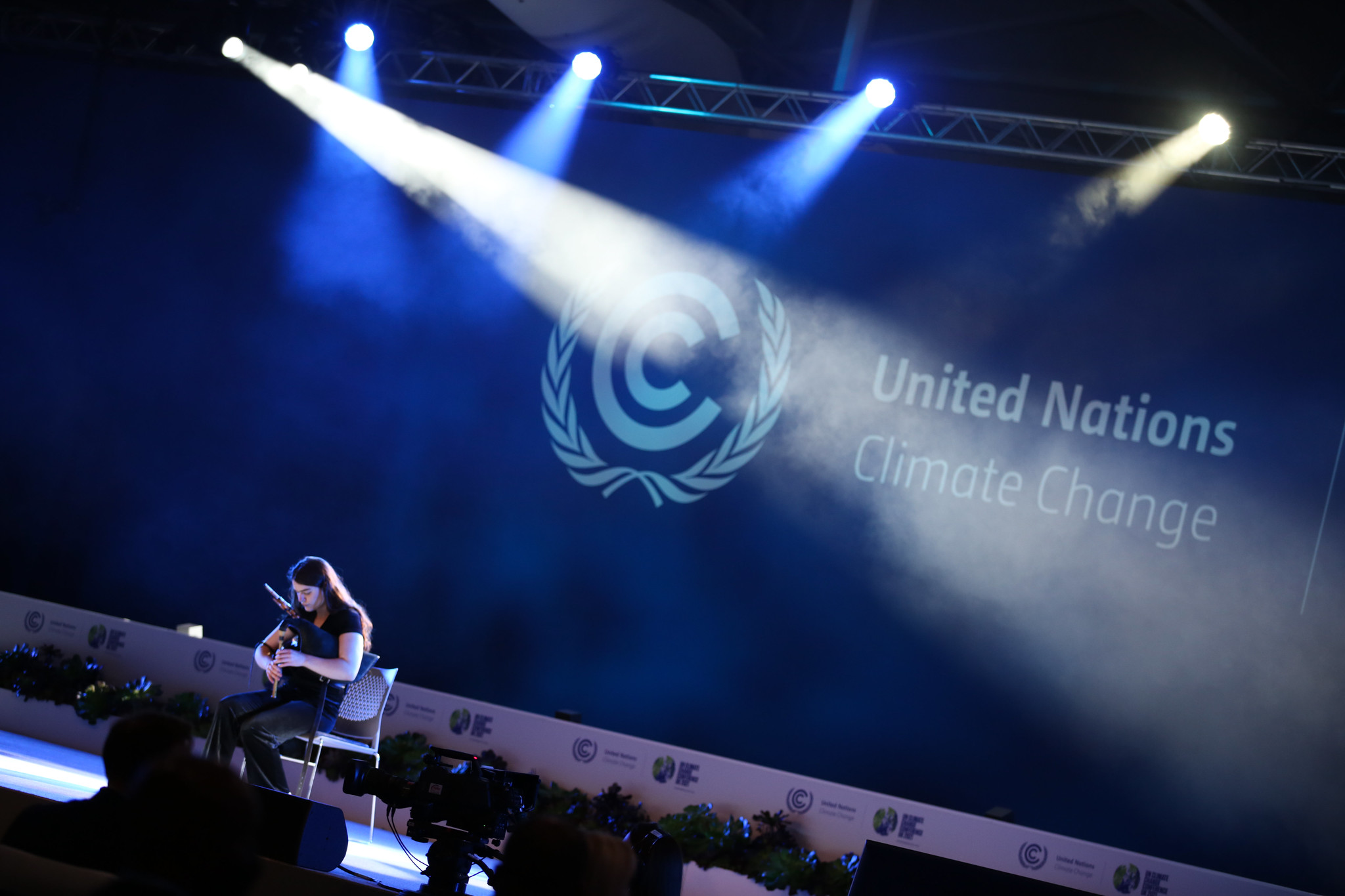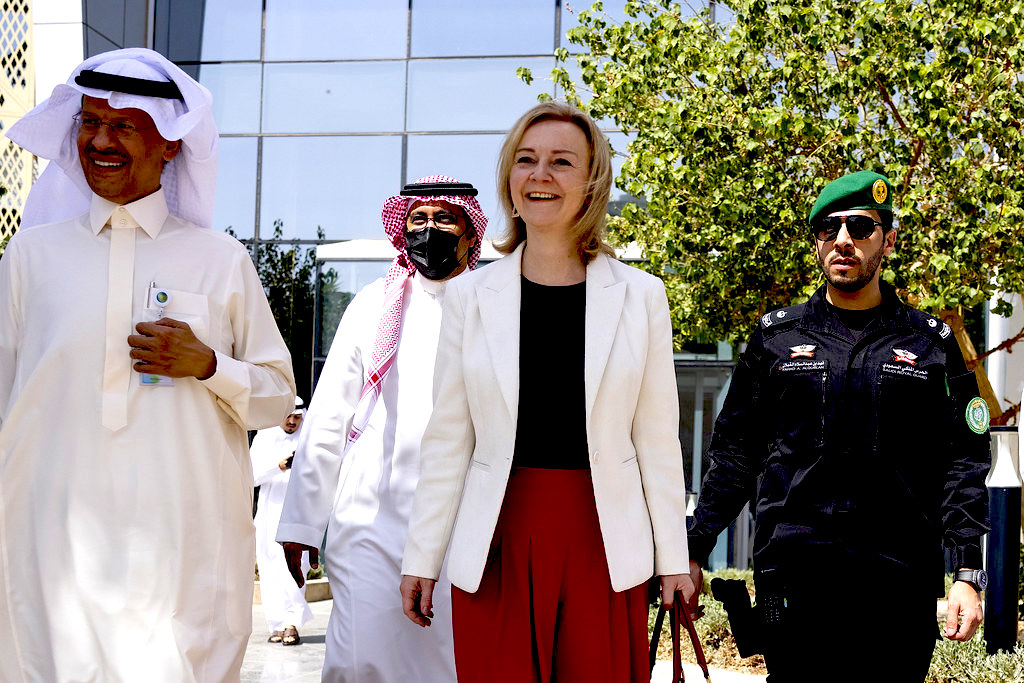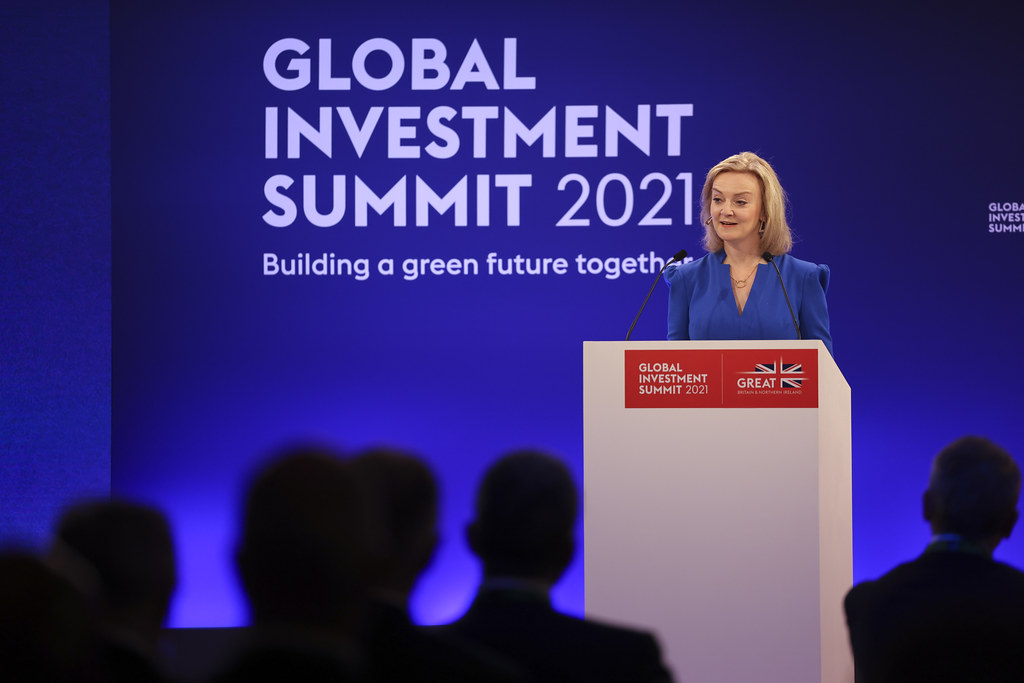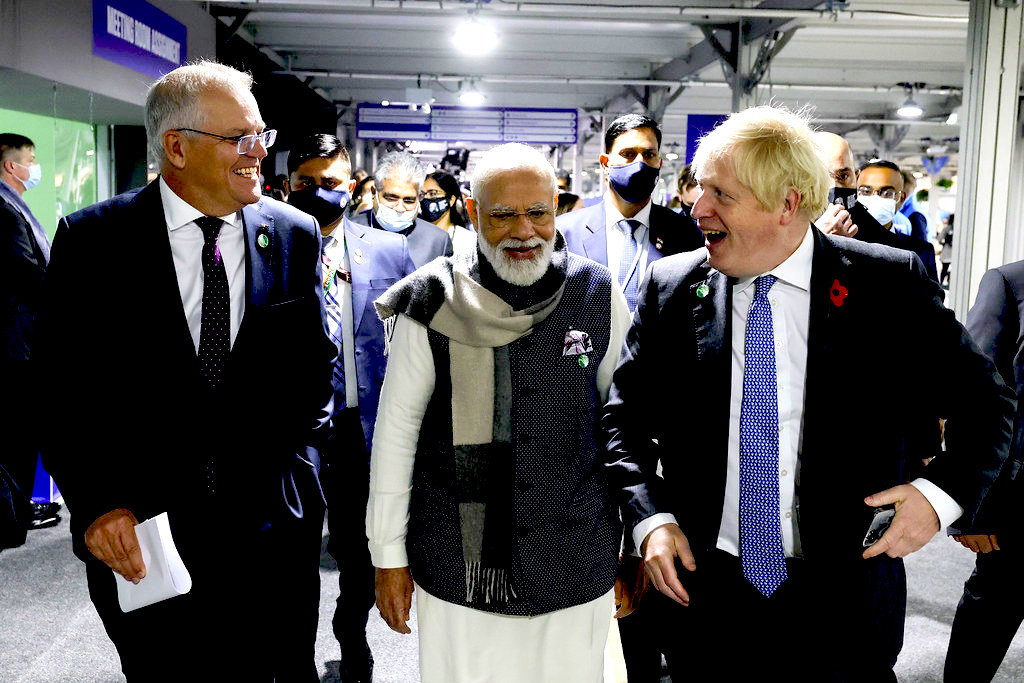The government’s fossil-fuel-expanding trade intentions raise urgent questions about its hosting of COP26, writes Nafeez Ahmed.

U.N. climate change meeting opening in Glasgow, Nov. 2. (UNclimatechange, Fl;ickr)
By Nafeez Ahmed
Declassified UK
 Last month, Greenpeace’s investigations unit Unearthed obtained a document leak showing that Saudi Arabia and the Organization of Petroleum Exporting Countries (OPEC), along with Brazil, Argentina, Japan, Norway and India, have attempted to neutralize a scientific assessment report being prepared by the Intergovernmental Panel on Climate Change (IPCC).
Last month, Greenpeace’s investigations unit Unearthed obtained a document leak showing that Saudi Arabia and the Organization of Petroleum Exporting Countries (OPEC), along with Brazil, Argentina, Japan, Norway and India, have attempted to neutralize a scientific assessment report being prepared by the Intergovernmental Panel on Climate Change (IPCC).
These countries have attempted to remove language in the report calling for an urgent system transformation involving a rapid phase-out of fossil fuels and other carbon-intensive industries such as beef and cattle farming.
But a series of documents published online by Britain’s Department for International Trade (DIT) reveals U.K. efforts to increase fossil fuel production in nearly all those countries, including Saudi Arabia — the world’s second largest oil producer.
Britain’s intent to ramp up fossil fuel production in partnership with some of the world’s biggest obstructers of climate action raises urgent questions about its role at COP26.
Saudi Arabia & OPEC

U.K. Foreign Secretary Liz Truss meeting with Saudi Energy Minister Prince Abdulazziz bin Salman in Riyahd, Oct. 20. (Simon Dawson/ No 10 Downing Street)
On the eve of COP26, Foreign Secretary Liz Truss flew to Saudi Arabia and Qatar to explore a potential trade deal with the six Gulf Cooperation Council countries.
Saudi Arabia was found to have demanded the removal from the report of the word “transformation” and “phrases like ‘the need for urgent and accelerated mitigation actions at all scales…’”. It also insists on reliance on unproven technologies such as carbon capture and storage (CCS) and direct air capture (DAC).
U.N. scientists have concluded there is little scientific evidence that CCS and DAC technologies can be made technologically and commercially viable, a finding echoed elsewhere.
Earlier in 2021, scientists at the Tyndall Centre for Climate Change Research found that CCS could not be relied on to deliver on carbon emission reduction targets, and that the majority of existing CCS facilities are simply being used to extract more oil which leads to continued emissions.
As one BNP Paribas analyst has described it, investing in these technologies is likely to be a “complete waste of time and effort.”
The Foreign Office’s rhetoric about the U.K.’s trade deal ambitions in the Gulf makes passing reference to “cleaner and more reliable infrastructure,” but Saudi Arabia’s green transition commitments to date have already been shown to be severely lacking in detail and substance.

U.K. Foreign Secretary Liz Truss caps off global investment gathering in London, Oct. 19. (Tim Hammond/No 10 Downing Street)
According to the U.K. Department for International Trade’s Exporting Guide to Saudi Arabia, some of the biggest opportunities for U.K. investment are in expanding the kingdom’s fossil fuel sector.
“There are significant opportunities in Saudi Arabia’s energy market for U.K. businesses, especially in oil and natural gas,” explains the document.
Increasing the kingdom’s natural gas production is a particularly lucrative area for U.K. industry. The DIT notes that Saudi Aramco, the kingdom’s giant oil producer, is exploiting natural gas reserves off the Red Sea coast to support increased domestic demand, which will involve using deep water technologies for drilling below 1,000 metres.
“This offers opportunities for U.K. engineering and service companies with experience in deep water regions, such as the North Sea”, the DIT states. The document makes no reference to supporting Saudi’s Vision 2030, the kingdom’s proclaimed renewable energy transition plan.
Norway’s ‘Opportunities’
Truss had previously brokered a trade deal with Norway, one of Europe’s biggest oil producers which is also the main supplier of oil and gas to the U.K. — accounting for 40 percent of Britain’s energy demand.
Norway was among several other actors, including Argentina and OPEC, which wanted U.N. scientists to delete their finding that “the focus of decarbonisation efforts in the energy systems sector needs to be on rapidly shifting to zero-carbon sources and actively phasing out fossil fuels.” Norway in particular demanded that CCS should be mentioned as a viable solution.
Yet the British government is also looking to actively expand its involvement in Norwegian oil and gas. According to the DIT’s Exporting Guide to Norway:
“The offshore oil and gas sector provides opportunities for U.K. companies in: Field life extension, enhanced/improved oil recovery (IOR/EOR) technologies, maintenance and modification work (MMO), standardisation of solutions, and low carbon disruptive technologies.”
Despite the reference to “low carbon,” the emphasis here is not on disrupting and phasing out the oil and gas production, but to the contrary, increasing it while implementing CCS technologies.
Similarly, despite the U.K.’s net-zero commitment, it became a net exporter of oil for the first time in 15 years in 2020. The U.K.’s industry body, Oil and Gas UK, now predicts that oil and gas will continue to provide two-thirds of Britain’s primary energy by 2035.
CCS is therefore being used as a “band-aid” strategy to continue supporting dangerous fossil fuel extraction, despite no scientific evidence that CCS facilities can sufficiently reduce emissions from fossil fuel production.
Australia – Getting ‘Over the Line’
The U.K. is also actively pursuing trade deals with other carbon lobbying governments identified in the Unearthed leak. Its “historic” draft deal with Australia, for instance, was achieved by dropping key climate pledges to get the deal “over the line” according to leaked government emails.
This included removing from the draft an explicit commitment to limit global warming to the 1.5C Paris Agreement target for a safe climate. Australian officials had attempted to get U.N. scientists to delete discussion of how fossil fuel lobbyists had watered down climate action in Australia, and rejected the idea of phasing out coal power stations.
India – Direct Investments

Left to right: Australian Prime Minister Scott Morrison, Indian Prime Minister Narendra Modi and U.K. Prime Minister Boris Johnson at COP26 meeting in Glasgow, Nov. 2. (Andrew Parsons/No 10 Downing Street)
Britain is also starting trade deal talks with India, which criticized the U.N. scientists’ lukewarm approach to nuclear power — described by Dr. Paul Dorfman of the UCL Energy Institute as an “out-dated technology” which simply “can’t compete with the technological, economic, safety and security advantages of the renewable evolution.”
One analyst linked to the Indian government was especially riled by the U.N. draft report’s opposition to coal, claiming that: “Coal is likely to remain the mainstay of energy production in the next few decades for sustainable economic growth of the country.” India is the world’s second biggest consumer of coal.
The British government is already active in cultivating UK and Indian fossil fuel industry partnerships. U.K. companies are responsible for over one third of all foreign direct investment into India’s oil and gas industry according to the DIT, and there are no signs that Boris Johnson plans to roll this back.
South America – ‘Demand for UK Expertise’
Britain is actively exploring trade deals with both Brazil and Argentina, although the latter opposes the U.N. draft report’s call for less meat consumption due to the massive role that beef and animal feed crops play in driving carbon emissions due to deforestation.
DIT’s Exporting Guide to Brazil notes how Britain could play a bigger role in Brazil’s oil and gas industry, which traded $5.6 billion in 2017 and 2018. It states that Brazilian oil production is predicted to “increase significantly by 2030,” and highlights how the U.K. can assist this: “There is demand for UK expertise in the following areas: offshore equipment and services, decommissioning, subsea technologies, field life extension, and inspection, repair and maintenance.”
As for Argentina, the DIT’s Exporting Guide similarly refers in glowing terms to the country holding “some of the largest gas and shale oil reserves in the world”.
Such large shale resources offer “opportunities to partner, build infrastructure and offer goods and services to support this industry,” observes the document. U.K. businesses which use chemical products to enhance recovery from oil wells will also “find a good market in Argentina.”
Britain’s trade relationships with the world’s loudest carbon industry lobbyists reflect the hollowness of the country’s net zero commitments. A major plank of Britain’s domestic net zero strategy is the establishment of four CCS facilities supposedly capable of capturing 20-30 million tonnes of CO2 by 2030, while oil and gas production increases in that time-frame.
This emphasis on an unproven techno-fix closely fits the demands of many of Britain’s trade allies who have lobbied the U.N. process to water down its forthcoming climate report. It sets an alarming precedent for the direction of travel at COP26 and beyond.
A government spokesperson said:
“We are working hard to drive down investment in fossil fuels which is why the Prime Minister announced last year that the government will no longer provide any new direct financial or promotional support to the fossil fuel energy sector overseas.
“The UK’s climate change and environment policies are some of the most ambitious in the world, reflecting our commitment as the first major economy to pass new laws for net zero emissions by 2050.”
Dr Nafeez Ahmed is an investigative journalist and complex systems analyst. He has broken exclusive stories on major international security issues encompassing foreign policy, terrorism, national security, the environment and finance.
This article is from Declassified UK.
The views expressed are solely those of the author and may or may not reflect those of Consortium News.

“The government’s fossil-fuel-expanding trade intentions raise urgent questions about its hosting of COP26, writes Nafeez Ahmed.”
One of the reasons that the Presidents of China and Russia are not present.
That is interpreted by some that they are “nervous of criticism”.
From the 1970’s onwards Ecocide in the Soviet Union was/is an integral part of the continuing transcendence of “The Soviet Union” by the Russian Federation including the increasing participation of those involved in this lateral process of transcendence, Mr. Ivanov and his associates being assigned prime focus in the matter and the recent meeting :
hXXps://tass.com/politics/1355261 refers; the scope of Mr. Ivanov’s role and those of Mr. Ivanov’s associates designed to maximise options of sustainable/holistic lateral moderations, since it is unlikely that non-holistic linear “solutions” are a sustainable option
although some opponents chose to misrepresent Mr. Ivanov’s promotion as him being “sacked”.
The “United Nations” approach is in part an emulation of Mr. Brezhnev’s approach when he wanted to do nothing he convened a meeting of The Council of Soviets.